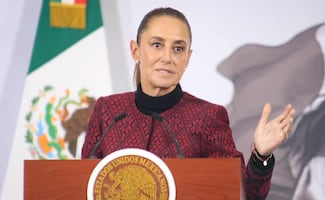Más Información

Banco Mundial recorta PIB de México a 1.3% para 2026; ajusta a la baja su estimación para el próximo año

Sheinbaum: Embajador Ronald Johnson, facilitador para llamada con Trump; siempre nos ha ayudado, afirma

IMSS, ISSSTE e IMSS Bienestar superan metas de atención en 2025; registran aumento en consultas y cirugías
Food scraps, product packaging, tissues, an empty bottle, and the morning is just beginning. In Mexico City , it is estimated that an average person generates about 1.5 kilos of Urban or Municipal Solid Waste ( MSW ). According to Mexico City's Urban Management Agency ( Agencia de Gestión Urbana abbreviated AGU ) MSW exceed 13,000 tons on a daily basis, while only 15% is separated for recycling.
In the country, MSW generation has increased significantly in recent years. According to Mexico's Ministry of Environment and Natural Resources ( Secretaría de Medio Ambiente y Recursos Naturales abbreviated SEMARNAT ), MSW annual average increased about 50% in the last decade as a result of urban growth, industrial development, technological development, and changes in consumption patterns. Even though MSW management and MSW recycling have increased in Mexico, the gap is still wide with several European countries which recycle more than 90% of their MSW through government policies and comprehensive environmental education programs that result in an environmental impact in the short, medium and long-term.
In March 2009 , Mexico City’s legislative assembly passed a measure that amends the City’s Solid Waste Law and MSW was separated in organic and inorganic waste. From then on, some boroughs have proven to be more effective on waste sorting. Iztapalapa, Gustavo A. Madero, Álvaro Obregón, and Azcapotzalco have managed to reduce their organic waste.
However, with the developing of municipal waste programs that regulate the storage, transportation, processing, and beneficial usage involving a thermovalorization plant and an anaerobic digestion plant , waste sorting should be more efficient. Basura Cero CDMx ( Zero Waste CDMX ) is among the new MSW programs whose main objective is to reduce waste in landfills. Effective on July 8 , a series of new regulations will come into effect meaning that people must divide their waste into recyclable inorganic waste (paper, cardboard, plastic, metal, among other materials), unrecyclable inorganic waste (cigarette butts, toilet paper, metal wrappers, diapers, napkins), organic waste , and bulky waste (televisions, refrigerators, washing machines, computers, cell phones, furniture, among other waste types that are too large to be accepted by the regular waste collection).

For Carlos Álvarez , environmental consultant and MSW management specialist , a stricter separation of MSW is directly linked to a new challenge: the urgency of generating clean energy. "In 1960 everything was paper, cardboard, and glass. The milk was sold in returnable glass bottles. Today, there are thirty different packages just for milk. In this sense, we have hundreds of unnecessary products," adding that “we have to understand that choosing what we consume and taking responsibility for our trash is a personal goal that helps to avoid a bigger problem, such as burying the trash."
sg
Noticias según tus intereses
[Publicidad]
[Publicidad]











